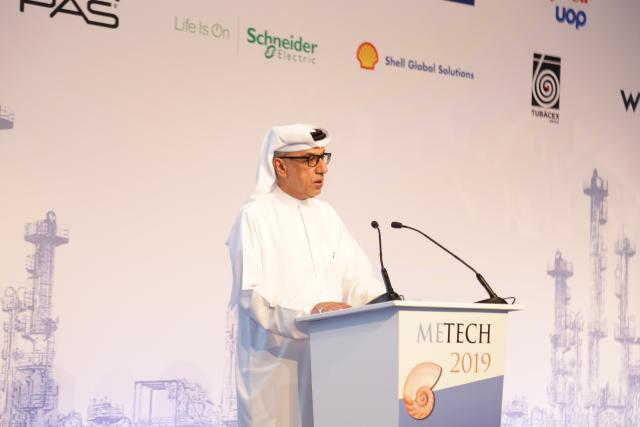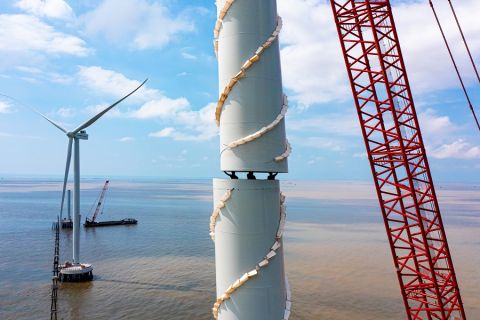
ADNOC Refining CEO Jasem Al-Sayegh speaks to attendees at the Middle East Technology Forum for Refining & Petrochemicals 2019 held in Abu Dhabi. (Source: ME-TECH/ADNOC)
National oil companies in the Middle East are trying to enter the chemical market to further diversify their national economies and benefit from access to abundant oil, but the lack of technology and knowhow is creating a big challenge, according to panelists speaking at the Middle East Technology Forum 2019 (METECH2019) on Feb. 26, which takes place in Abu Dhabi. Furthermore, panelists also discussed the impact of crude oil to chemicals on the global oil demand in the future.
Among the lessons oil companies learnt in the recent downturn is to integrate their business, that’s why oil producers are planning to convert 3 million barrel of crude oil into chemical to produce almost 150 million ton of various chemical products, but this seems to be very challenging, according to Sanjay Sharma, vice president from Middle East at India at IHS Markit.
“Oil companies in the region are pushing to build chemical portfolios, which requires additional market access and capital capability, in addition to the know how necessary to harness vast hydrocarbons resources in the region,” he added.
The competitive landscape has changed and continues to change with shale gas, coal based chemicals, advantaged feedstock limitation in the Middle East, and oil companies focused on chemicals.
“But National Oil Companies in the region do not have technological, operational and market knowledge. And their country’s strategy impact their investment decision,” he said.
Sharma said that crude oil demand will plateau or even decline by 2040, he also said that IHS Markit expects oil prices to hover around $70 per barrel in the near future.
“While oil demand is set to plateau, the higher level of crude to chemicals conversion has a potential to create additional demand for crude oil,” he said. “Oil will become increasingly more important as a feedstock in the production of petrochemicals.”
The crude oil to chemical technology converts crude into chemicals and creates high-value product streams to make larger quantities. The process is said to generate fewer emissions compared with conventional techniques. The technology is expected to profoundly impact the global petrochemical industry.
“The crude oil to chemicals technology requires a significant reconfiguration of the refinery to upgrade heavy products to chemicals. It goes beyond the state-of-art refinery-petrochemical integration,” Richard Charlesworth, executive director, oil, midstream, downstream & chemicals at IHS Markit, said.
The crude oil to chemicals technology’s impact lies in its huge scale and huge chemical yields, which can overwhelm even the largest conventional petrochemical plants.
“It wouldn’t take more than a few crude oil to chemical technology to dramatically alter the world’s energy supply and demand balance, including petrochemicals and refining. The technology is the most important new development in basic petrochemicals, it deserves our closest attention,” Charlesworth added.
In addition, hydrocracking for crude oil to chemicals technology requires catalysts that can produce more light and heavy naphtha, rather than middle distillates and diesel for fuel production.
“Targeting chemicals changes crude selection and optimum configuration, which will further impact global oil market in the future,” Charlesworth said. “Hydrogen consumption, total utilities consumption, product yield, and capital investment are key performance indicators of the technology efficiency.”
World-scale crude oil to chemicals technology projects are already in planning, execution and operating. ExxonMobil is the first company in the world to introduce the technology in 2014 in Singapore. China is currently executing the development of a two integrated projects that will convert Middle Eastern oil crude into more than 4 million tons per annum of para-xylene plus olefins derivatives. Meanwhile, Saudi Arabia has unveiled two projects using crude oil to chemicals technology, and are still in the planning phase; one of the projects is set to convert 400,000 barrels of oil at Yanbu refinery on the Red Sea coast of Saudi Arabia into 9 million tons of various petrochemical products with a total investment cost exceeding USD20 billion.
Jasem Ali Al Sayegh, CEO of ADNOC refining said during his keynote speech that oil and gas industry is moving towards new era where technology and innovation are key for remaining competitive, adding that ADNOC has embraced disruption and stepping out of its comfort zone. “At ADNOC, we are giving this mission a simple name of Oil and Gas 4.0,” he added.
He also said that by embracing Oil 4.0 and opening up to the benefits of technology, the company intends to transform its business and enable the next phase of global development.
Arvind Aggarwal, principal at Nexant discussed market dynamics for crude oil and refined products, and the structural shifts in the refined products demand outlook, where he said that 2019 will be challenging times across many countries and region, with ‘peak oil’ demand is a possibility. He also said that increases in U.S. supplies dominated supply increases elsewhere in the world, adding that the U.S. should be key in managing crude oil prices.
He also said that global refined product demand growth is linked to GDP growth.
“Long term global growth for refined products forecast at over 1% per year, while GDP growth is estimated at 3%,” Aggarwal said.
Recommended Reading
Energy Transition in Motion (Week of Feb. 2, 2024)
2024-02-02 - Here is a look at some of this week’s renewable energy news, including a utility’s plans to add 3.6 gigawatts of new solar and wind facilities by 2030.
After Challenging Year, Which Way Will Offshore Wind Blow?
2024-04-03 - Following a year of negative headlines with some of the industry’s biggest players booking billion-dollar impairments and backing out of wind projects, this year appears to be going smoother.
First US Utility-scale Offshore Wind Farm Starts Operations
2024-03-14 - The 12-turbine, 130-megawatt South Fork Wind project is a joint venture between Denmark's Orsted and New England-based electric utility Eversource.
Dominion Energy Receives Final Approvals for 2.6-GW Offshore Wind Project
2024-01-30 - Dominion Energy’s Coastal Virginia Offshore Wind project will feature 176 turbines and three offshore substations on a nearly 113,000-acre lease area off Virginia Beach.
Energy Transition in Motion (Week of Feb. 23, 2024)
2024-02-23 - Here is a look at some of this week’s renewable energy news, including approval of the construction and operations plan for Empire Wind offshore New York.




